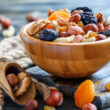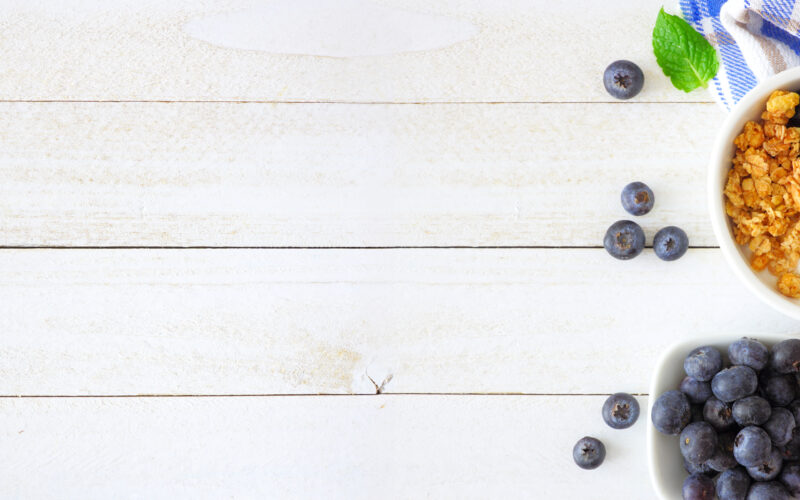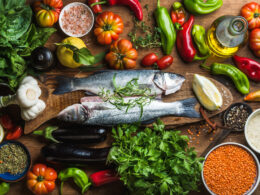Busy days at work and with the kids, plus a packed social calendar means your life isn’t always conducive to eating healthy, vitamin-packed meals.
“So many women tend to be deficient in nutrients that play key roles in our health,” says Carol Haggans, a registered dietitian with the National Institute of Health’s Office of Dietary Supplements.
Learn more about these five important vitamins and minerals and how to get more of them in your diet.
1. Calcium fights PMS.
You probably know that calcium prevents osteoporosis, but a diet rich in calcium is also shown to prevent PMS symptoms, according to a study from the University of Massachusetts at Amherst. That’s good news if you’re one of the roughly 85 percent of women who suffer from cramps, fatigue, irritability and bloating each month.
Even if your cycle is pain-free, know that foods rich in this mineral have also been linked to a lower risk of high blood pressure and some cancers, although more studies are needed to say for sure.
Increase your intake: A staggering 78 percent of American women don’t get the recommended 1000 to 1200 mg of calcium each day. So reach for low-fat dairy foods, which are an excellent source, says Haggans. You’ll find plenty — milk, yogurt, cottage cheese — in single-serve, carpool-friendly containers.
2. Vitamin D boosts your immunity.
Haggans calls vitamin D the newest “wonder nutrient,” since recent research has found that the vitamin, which plays a role in your immune system, may help you ward off such respiratory infections as the flu.
Vitamin D’s main function is to help your body absorb calcium, yet it may also protect you from diabetes, hypertension and some cancers, including breast cancer, according to other studies.
Increase your intake: Milk and other dairy products fortified with vitamin D will help you consume the recommended 400 IUs. Also eat fatty fish like mackerel and salmon twice a week, says Haggans.
3. Iron increases energy.
Forget pumping iron: Eating iron can help you feel strong too. Iron is necessary for blood cells to carry oxygen throughout the body. Getting enough iron keeps you energized, whether you’re on a power walk or running to a parent-teacher conference.
Iron also helps ferry oxygen to your brain. Adequate amounts of the mineral may help you stay more alert, think clearly and concentrate.
Increase your intake: Attain your 18 mg a day by eating beef, turkey and oysters. Also try lentils, beans and tofu, but eat them with vitamin C-rich foods, such as red peppers. (Vitamin C helps your body better absorb plant-based iron.) “Women who are menstruating or pregnant can have trouble getting enough iron,” says Haggans.
4. Folate protects your breasts.
You may do self-exams and have a doctor check you annually. But getting enough folic acid is also healthy-breast behavior. Women who eat foods high in folic acid and vitamin B-6 have a lower chance of breast cancer, report Harvard University researchers.
A lack of folate may also cause birth defects, so adequate intake is essential for women of childbearing age, even if you aren’t actively trying for kids. “It’s key to have enough folate in your system since birth defects can form before you even know you’re pregnant,” says Haggans.
Increase your intake: Hit your recommended 400 mg with fortified cereals and bread, spinach, asparagus and beans. Eating plenty of these foods are especially vital for women who drink alcohol. Even moderate drinking may interfere with your body’s absorption of the nutrient.
5. Fatty acids keep your heart healthy.
“Low fat” used to be the diet term du jour. Now experts encourage “good” fats, particularly omega-3 fatty acids. These fats protect against heart disease by reducing the presence of triglycerides (a fatty substance in blood linked to coronary disease), lowering blood pressure and preventing artery blockages, according to research from the Agency for Healthcare Research and Quality.
Other studies have linked omega-3-rich diets with a decreased risk for depression and certain cancers, although more conclusive evidence is needed, says Haggans.
Increase your intake: There’s no specific amount recommended, but Haggans suggests eating fish such as salmon, mackerel or sardines twice a week.
“You can get enough vitamins, fatty acids and minerals from a balanced diet,” says Haggans. “But if you need assistance meeting your requirements, talk to your doctor before turning to a supplement.” Some supplements can interfere with medications or put you at risk for a vitamin or mineral overdose.
Photo: Corbis Images









